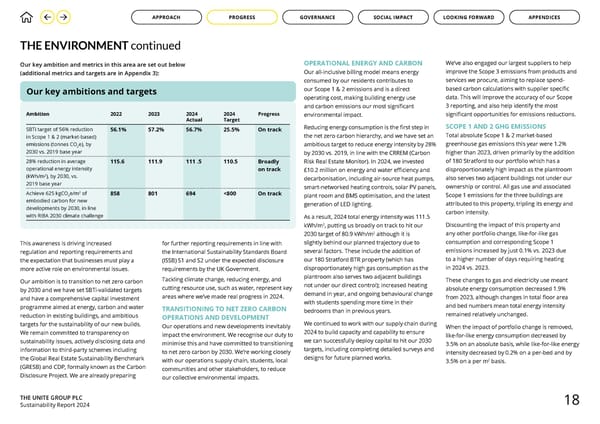THE ENVIRONMENT continued THE UNITE GROUP PLC Sustainability Report 2024 This awareness is driving increased regulation and reporting requirements and the expectation that businesses must play a more active role on environmental issues. Our ambition is to transition to net zero carbon by 2030 and we have set SBTi-validated targets and have a comprehensive capital investment programme aimed at energy, carbon and water reduction in existing buildings, and ambitious targets for the sustainability of our new builds. We remain committed to transparency on sustainability issues, actively disclosing data and information to third-party schemes including the Global Real Estate Sustainability Benchmark (GRESB) and CDP, formally known as the Carbon Disclosure Project. We are already preparing for further reporting requirements in line with the International Sustainability Standards Board (ISSB) S1 and S2 under the expected disclosure requirements by the UK Government. Tackling climate change, reducing energy, and cutting resource use, such as water, represent key areas where we’ve made real progress in 2024. TRANSITIONING TO NET ZERO CARBON OPERATIONS AND DEVELOPMENT Our operations and new developments inevitably impact the environment. We recognise our duty to minimise this and have committed to transitioning to net zero carbon by 2030. We’re working closely with our operations supply chain, students, local communities and other stakeholders, to reduce our collective environmental impacts. OPERATIONAL ENERGY AND CARBON Our all-inclusive billing model means energy consumed by our residents contributes to our Scope 1 & 2 emissions and is a direct operating cost, making building energy use and carbon emissions our most significant environmental impact. Reducing energy consumption is the first step in the net zero carbon hierarchy, and we have set an ambitious target to reduce energy intensity by 28% by 2030 vs. 2019, in line with the CRREM (Carbon Risk Real Estate Monitor). In 2024, we invested £10.2 million on energy and water efficiency and decarbonisation, including air-source heat pumps, smart-networked heating controls, solar PV panels, plant room and BMS optimisation, and the latest generation of LED lighting. As a result, 2024 total energy intensity was 111.5 kWh/m2, putting us broadly on track to hit our 2030 target of 80.9 kWh/m2 although it is slightly behind our planned trajectory due to several factors. These include the addition of our 180 Stratford BTR property (which has disproportionately high gas consumption as the plantroom also serves two adjacent buildings not under our direct control); increased heating demand in year, and ongoing behavioural change with students spending more time in their bedrooms than in previous years. We continued to work with our supply chain during 2024 to build capacity and capability to ensure we can successfully deploy capital to hit our 2030 targets, including completing detailed surveys and designs for future planned works. We’ve also engaged our largest suppliers to help improve the Scope 3 emissions from products and services we procure, aiming to replace spend- based carbon calculations with supplier specific data. This will improve the accuracy of our Scope 3 reporting, and also help identify the most significant opportunities for emissions reductions. SCOPE 1 AND 2 GHG EMISSIONS Total absolute Scope 1 & 2 market-based greenhouse gas emissions this year were 1.2% higher than 2023, driven primarily by the addition of 180 Stratford to our portfolio which has a disproportionately high impact as the plantroom also serves two adjacent buildings not under our ownership or control. All gas use and associated Scope 1 emissions for the three buildings are attributed to this property, tripling its energy and carbon intensity. Discounting the impact of this property and any other portfolio change, like-for-like gas consumption and corresponding Scope 1 emissions increased by just 0.1% vs. 2023 due to a higher number of days requiring heating in 2024 vs. 2023. These changes to gas and electricity use meant absolute energy consumption decreased 1.9% from 2023, although changes in total floor area and bed numbers mean total energy intensity remained relatively unchanged. When the impact of portfolio change is removed, like-for-like energy consumption decreased by 3.5% on an absolute basis, while like-for-like energy intensity decreased by 0.2% on a per-bed and by 3.5% on a per m2 basis. GOVERNANCE APPROACH PROGRESS SOCIAL IMPACT LOOKING FORWARD APPENDICES Our key ambitions and targets Ambition 2022 2023 2024 Actual 2024 Target Progress SBTi target of 56% reduction in Scope 1 & 2 (market-based) emissions (tonnes CO2e), by 2030 vs. 2019 base year 56.1% 57.2% 56.7% 25.5% On track 28% reduction in average operational energy intensity (kWh/m2), by 2030, vs. 2019 base year 115.6 111.9 111 .5 110.5 Broadly on track Achieve 625 kgCO2e/m2 of embodied carbon for new developments by 2030, in line with RIBA 2030 climate challenge 858 801 694
 Making a Positive Impact: Unite Students Sustainability Report 2024 Page 18 Page 20
Making a Positive Impact: Unite Students Sustainability Report 2024 Page 18 Page 20